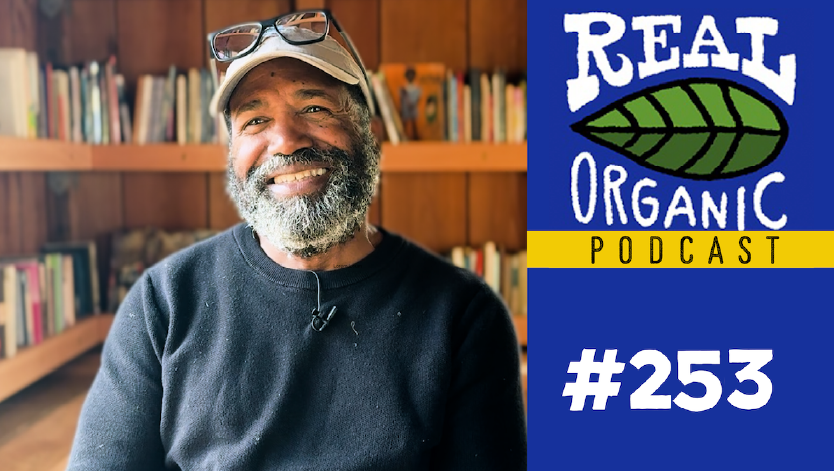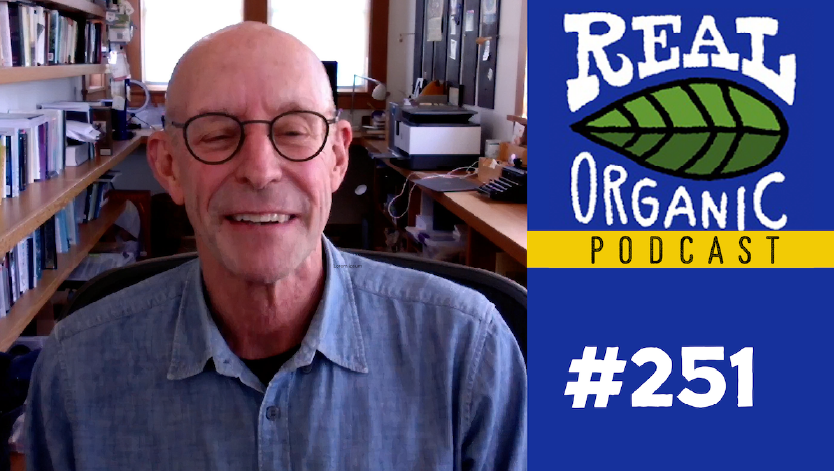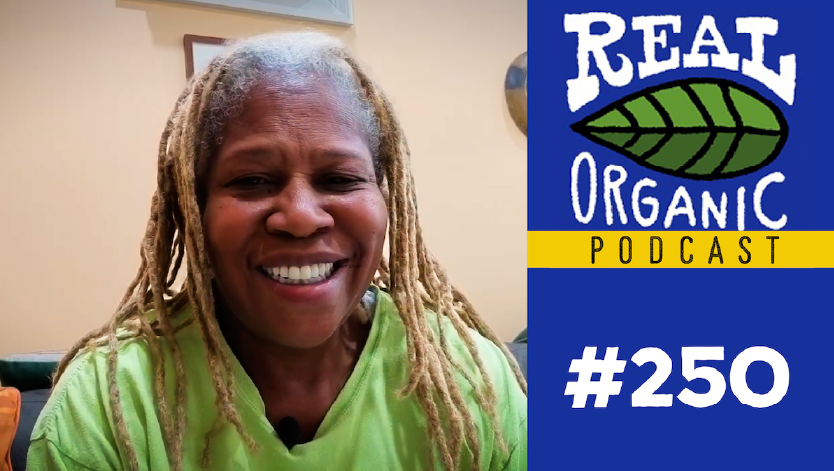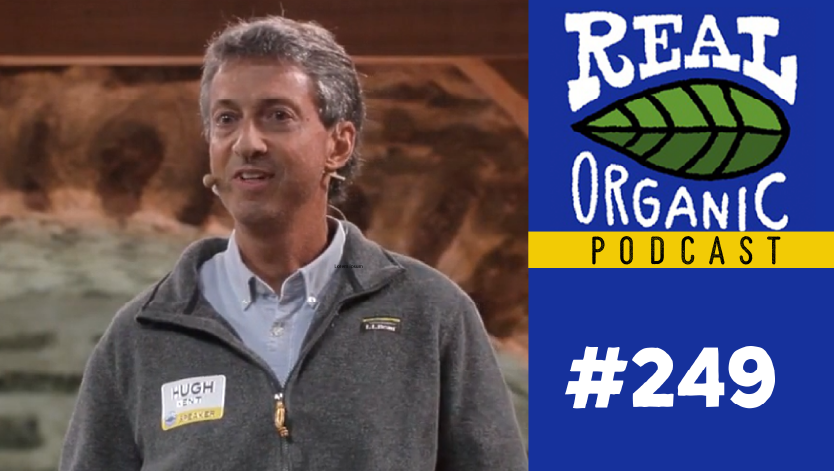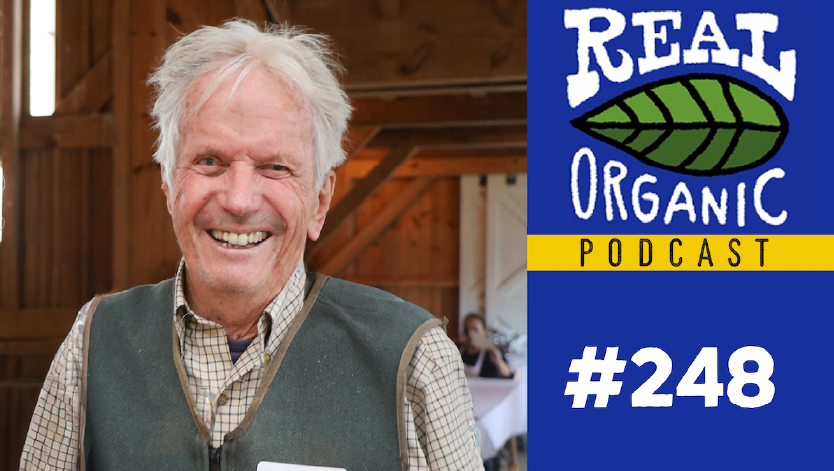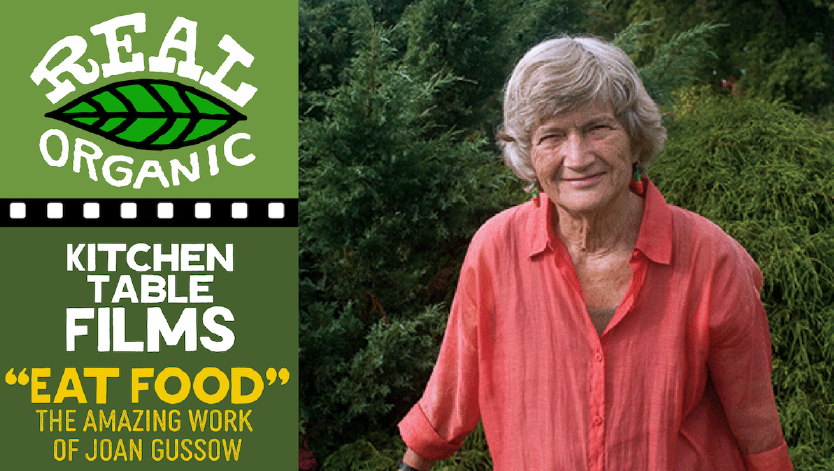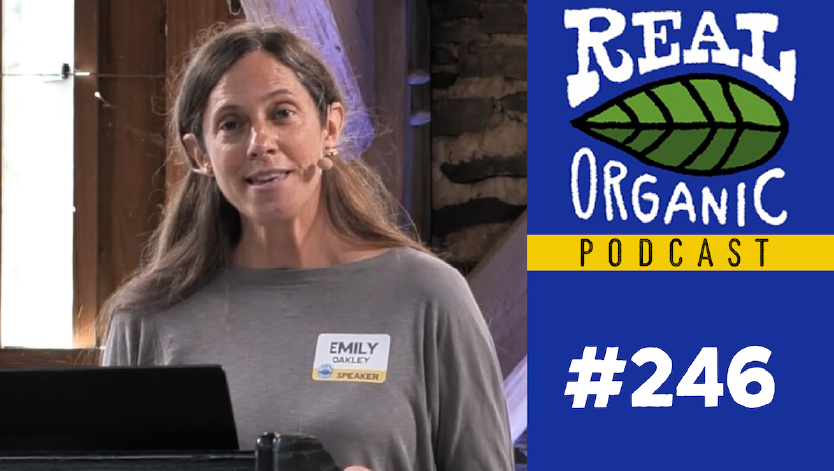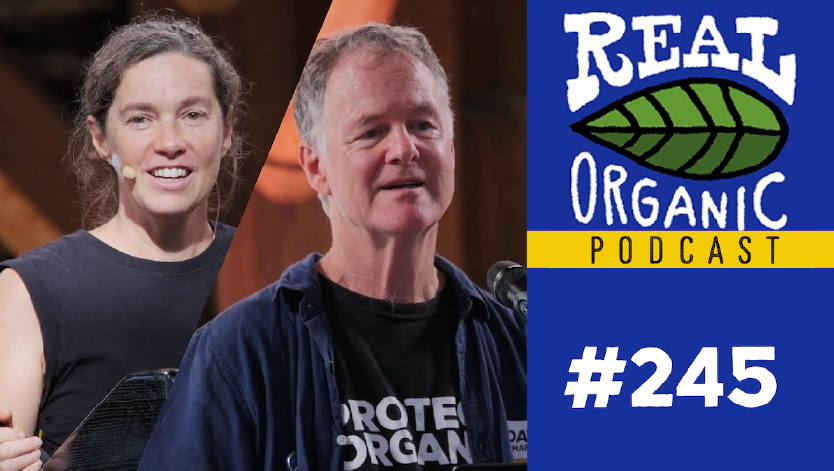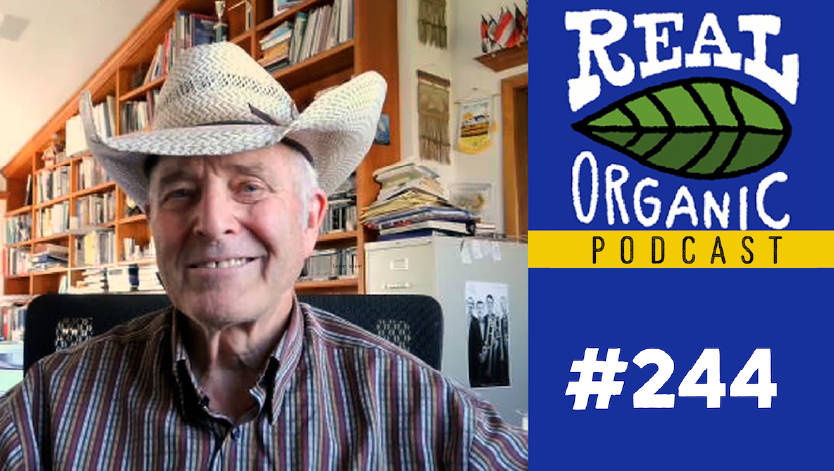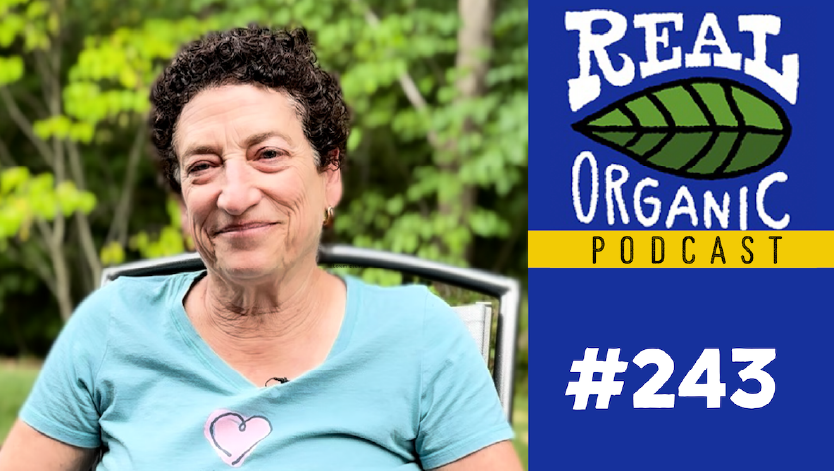Episode #240
Barbara Kingsolver: Food Systems + Truth-Telling With Joan Gussow
Pulitzer Prize–winning novelist and essayist Barbara Kingsolver reflects on her friendship with food thinker Joan Gussow, the loss of food culture in America, and why gardening, writing, and environmental work are inseparable parts of a whole life. She speaks to the dangers of a corporate-driven food system, the power of fiction to open hearts, and the necessity of treating hope as a practice — a daily act of responsibility for the future.
Our Barbara Kingsolver interview has been edited and condensed for clarity:
You can subscribe and download episodes of our show through your favorite podcast app, our YouTube channel, or stream the audio-only version here:
Dave Chapman interviews Barbara Kingsolver, August 2025:
Dave Chapman 0:00
Welcome to the Real Organic Podcast. I’m very pleased to be talking with Barbara Kingsolver today. I was just saying with Barbara that I got here because she was friends with Joan Gussow. We’re putting together a special, but it’s an honor to be talking to you. I just listened to “Animal, Vegetable, Miracle: A Year of Food Life,” which had your voice reading the part, and I appreciated that. You did a great job.
Barbara Kingsolver 0:35
Thank you. My daughter and your husband read their parts.
Dave Chapman 0:39
Your daughter and your husband I love them being in it too, seriously.
Barbara Kingsolver 0:43
It was a family project, and we went into the studio as a family. I always record my own audiobooks, so I thought they should do the same.
Dave Chapman 0:53
Absolutely. I interviewed Michael Pollan a few times, and he said he wants to redo the recording of “The Omnivore’s Dilemma” because it’s a memoir and it should be in his voice. I was so pleased when I found that yours was in your voice.
Barbara Kingsolver 1:08
Yeah. Even my novels, I do myself. I like going into the studio. To talk about Joan will be emotional for me, but I wanted to do this because I’m really sad I didn’t get to say goodbye properly to Joan. The last time I was with her, we didn’t know it was the last time we would be together.
Barbara Kingsolver 1:34
Of course, I talked with her after that by phone, but I didn’t get to really say goodbye. So, thank you for inviting me to do this for her. I couldn’t go to a memorial because I live a long way away. For me, this is some closure that I appreciate.
Dave Chapman 1:53
Yeah, absolutely. I did go to the memorial down at Columbia, and it was beautiful. There were all these women who had studied with Joan in the room. Some were my age, which is 20 years younger than Joan, and some were 20 years old. It was wonderful. How did you get to know Joan? How did that happen?
Barbara Kingsolver 2:19
I don’t even know why, but Chelsea Green sent me a galley of “This Organic Life: Confessions of a Suburban Homesteader” that must have been in 2000. I’m not an academic, so I wasn’t familiar with her academic writing. I wasn’t in that field at all. I was a novelist who grew up on a farm and live on a farm now, and I have been engaged with gardening and agriculture my whole life. I don’t know why they thought to do this, but Chelsea Green sent me a galley.
Barbara Kingsolver 2:59
I read the book, and I was so moved that I wrote Joan a letter, and she wrote back, and we became immediately very close. Joan was like a mother to me. She really was. I know that people who know her might laugh about that, because she wasn’t a real teddy bear kind of person, but she got me in a way that no parent ever had.
Barbara Kingsolver 3:33
As it happens, she was exactly the same age as my parents, and yet there was no generational divide between us in the way that we conceived of, I want to call it, right livelihood. For me, gardening isn’t just a hobby. Writing isn’t just a job, and protecting the environment isn’t just something I do on weekends. All of those things are one for me. It’s a spiritual construct for me. I can feel her smirking at the word “spiritual,” but I know she felt it the same way.
Barbara Kingsolver 4:29
It’s how you go to bed at night feeling at peace with yourself. I know that she shared that. We had an immediate connection. She was very fond of me, and very solicitous. She gave me recipes that we still use. Every time I open my freezer, I say, “Hello, Joan,” because it’s full of her recipe for glut sauce that we make, and our enchilada sauce. All these things that the perfect mother, in my opinion, would do.
Barbara Kingsolver 5:03
We became really close. She came to visit me, and we sat in my garden and pulled weeds together for hours along with Toni. Toni came with her one time, and we all pulled weeds together. I visited her in Piermont many times. Every time I was in New York, I would make sure to see Joan, ideally to go up there and pull weeds in her garden with her.
Barbara Kingsolver 5:28
We often made a point of going across the bridge to Blue Hill and having a grand dinner over there, where she was a celebrity. They would ply her with wine, and I would drive home. It was a really emotionally comforting, spiritually, as I’ve said, and intellectually comforting relationship that we had. It meant the world to me. I’m really, really sad that she’s gone.
Dave Chapman 6:06
I shared a meal with her at Stone Barns at Blue Hill also, and also drove her back across the bridge late at night. Yeah, it’s lovely. I really like what you’re saying about these different parts of your life fitting together in a way that they’re almost equally important in different ways.
Barbara Kingsolver 6:30
And integrated – they’re not separate. That’s the thing. Work life, farm work, food work, literary work, and environmental work are all the same. The fact that she made that her life is something that I admire immensely.
Dave Chapman 6:54
She once said to me that when she was developing the course, Nutritional Ecology, it had all this research that was just completely separate. She laid it all out on the floor, and she was trying to figure out, “How does this all fit together?” I think that’s what you’re talking about – how do we make sense of this? The isolation of our knowledge into these different categories is very powerful, but it’s also led us astray in a really basic way.
Barbara Kingsolver 7:29
Yeah, it has, and particularly with respect to food. The most fundamental connection we have is to our food. We have to have it at least three times a day, every day. It’s the one part of our lives that we cannot neglect. We have to make choices daily. We have to put our resources and energy into it. It stands for love in the way that we give it to our families.
Barbara Kingsolver 8:02
It’s so integral to existence, and yet, in our country, in the sort of post-World War II development of the food industry, it was all about taking it away from us – removing us from the process. For me, that’s the spiritual component of all this – regaining that connection with process.
Barbara Kingsolver 8:33
To literally know where your food comes from, how it got there, how it grew, the natural history of your food, and the processing, to be a part of all that and re-engage with that is a journey that seems incredibly satisfying to everybody who comes around and discovers it for themselves. You end up saying, “How did we let go of something so important?”
Dave Chapman 9:04
Do you have any thoughts about how we let go of something so important? I loved your trip with Steven to Italy. You’d already made me want to have a garden, and I’m still farming, so I don’t have a garden, but I will. I’m going to have a garden. You made me want to eat everything local if possible, and I’m mostly there, but you made me want to go further. You also made me want to go to Italy, and that was unheard of. How did we lose that culture of…?
Barbara Kingsolver 9:39
Capitalism. If you sat down with Joan, she would just tick right through it. It had to do with industrialization, with all of this nitrogen that wasn’t going to make bombs anymore that needed to be sold. The corporatization of all of this. Not starting with what is healthy and enjoyable for the consumer, but looking at what is profitable for the producer.
Barbara Kingsolver 10:15
Okay, we have all this corn, we can make high fructose corn syrup with it, and transport that efficiently. So, what can we pour that into? The starting point isn’t the human, the starting point in the US is the profit and the industry. So, of course, you end up with junk. That just never happened in Italy or France. Imagine French people being force-fed high fructose corn syrup. There would be revolution.
Dave Chapman 10:50
Yeah. There seems to be an active political resistance to the invasion of all this stuff.
Barbara Kingsolver 10:59
Oh, absolutely. The farmers march on the capital. They bring their tractors into town.
Dave Chapman 11:08
They bring their manure spreaders into town
Barbara Kingsolver 11:12
Yeah, appropriately enough. The consumers are right – they’re with them. I think so much of it has to do with culture. We talked about that in our book – a food culture creates and reinforces the importance of particular foods and their preparation. It becomes something that you pass down in your family. It becomes something that you gather around.
Barbara Kingsolver 12:02
Those food cultures just got lost in the US. I think that’s partly because we’re a nation of immigrants, and we brought our own food cultures from a thousand other places, and we still have them to an extent. But instead of real Italian food, when it’s corporatized it’s Pizza Hut, and instead of real Mexican food, when it’s corporatized, it’s Taco Bell. It’s an economic and industrial issue here where the food cultures just get sort of ground up and spat out as something profitable.
Dave Chapman 12:53
Yeah. In your mind, the conflict here is really about money. It’s really the economic system. It’s not about whether the agricultural system might be good. That’s not the question.
Barbara Kingsolver 13:13
It’s not even a question. Corporations run this country, and that’s that. But let’s talk about Joan.
Dave Chapman 13:19
Yeah, let’s talk about Joan. Did you learn most of what you learned from Joan in conversation, or were some of her books really powerful for you in changing your mind?
Barbara Kingsolver 13:34
I wouldn’t say she changed my mind about anything big. I think the reason we became instantly such close friends is that she validated and articulated everything that I already believed in a way that made me… I think that the blurb that I ended up writing for “This Organic Life: Confessions of a Suburban Homesteader” was, “This is the book I can hand to people now when they ask me why I go to the trouble to grow my food.” Everything was there.
Barbara Kingsolver 14:06
I hadn’t written my book about that yet. I knew, or thought I probably would. At that point, in Tucson, we were kind of counting down until we could move back to Appalachia, which is my home and the center of the universe, thank you very much. It’s the only place I ever really felt at home, and the place you can really garden.
Barbara Kingsolver 14:35
But I was gardening in Tucson, where it’s like gardening on the moon, honestly. You lovingly water and tend a little piece of ground, and then everything in the desert comes and scorches it and eats it. It’s really hard work. I had built a cage around my garden that looked like Fort Knox. I worked so hard to grow fruits, tomatoes, and peppers.
Barbara Kingsolver 15:10
All my friends asked, “Why do you do this? You can buy those things at the grocery store.” I couldn’t explain. She explained it so beautifully. I thanked her for that, and appreciated that. How did I learn to garden? By growing up on a farm. I grew up in the middle of an alfalfa field, but we also grew most of our own food when I was growing up, so I knew how to do that. I knew that it was the right thing to do.
Barbara Kingsolver 15:48
As I said, I’m not an academic, so I hadn’t really studied the food system as Joan had, but I’m trained as a biologist, and I have studied food webs and ecology. I already knew a whole lot about what was wrong with industrial agriculture. So, we just clicked. We had a meeting of minds and of spirits.
Barbara Kingsolver 16:16
As I say, she was my mother’s age, and she got me. She understood me and supported me in a way that I needed. It was just a friendship that was not entirely organized around food, largely, but also her outlook on life was very reinforcing to me.
Barbara Kingsolver 16:42
I remember one time it was a rotten spring – one of those springs where it never stops raining or something. I don’t remember exactly what, and her poor garden was always drowning. This was probably April, and she was just saying what a bad spring it was in her garden. I said something, as you do. I said, “Well, there will be other springs.” She was maybe 75 years old at the time, I don’t know.
Barbara Kingsolver 17:21
She said, “Barbara, I don’t have that many springs left,” which just shut me right up. But there are two things I can say about that. One is that was Joan- there was no bullshit. She did not harbor fools, and she did not put up with delusion, or putting lipstick on any pig. She was really very – some people would say – blunt. That was just her wiring and her personality. She was very straightforward. I loved that about her.
Barbara Kingsolver 18:01
In a culture that so often deals in evasion, with people you don’t really know where you stand, you just knew where you stood with Joan. She said what she thought was true, regardless of how it was going to land. So, I just always think about that, and that was inspiring to me to be more like that – to be more direct. I was raised southern. I’m always going to be sweet. But she was instructive to me in how to be honest with people and to be a truth teller. It’s something that our culture needs.
Barbara Kingsolver 18:42
The other thing I can say about her complaint that she didn’t have that many more springs is I didn’t believe her. I said to her, “Joan, you’re going to outlive us all.” She seemed like a person who would live to be 110 years old, and she didn’t. She made it almost to 100 years old, and I’m really thankful for that. I’m even more thankful that she made it almost to 100 years old as fully herself, still out there in her garden, and doing all of those things we’ve talked about that made her life whole. She is an inspiration to me.
Dave Chapman 19:30
Yeah, absolutely. She was still teaching at 92 years old. Very remarkable. Teaching a course that changed people’s lives. It’s pretty amazing. I didn’t know Joan when she was younger but I get the feeling looking at her life and talking to people about her, and talking to her that, when she started, she was kind of a lone voice in the wilderness. She was talking about things that seemed crazy to people, and she was constantly being called a food faddist in the beginning of her career teaching.
Barbara Kingsolver 20:15
I think there are a lot of reasons for that, but partly because she was working in that intersection of science and calling out the industrial bosses, and because she was a woman. I didn’t know her either before 2000, but when I look at pictures of her when she was young, oh, my god, she was a babe. She was gorgeous. She was a babe till the end, of course. But I couldn’t ever imagine Joan in earrings, that was the thing. She had her glam days, I guess.
Barbara Kingsolver 20:58
When I look at her career, and at the truth teller that she was, and the blowback that she got, I think of Rachel Carson. I think that Joan was positioned in a very similar way, in a field where women were not going to be respected, particularly if they were calling out the big boys.
Barbara Kingsolver 21:21
So, I’m happy that Joan’s trajectory was longer than Rachel Carson’s, that Joan got to live to see a lot of the world getting on board with the things she was trying to bring our attention to, and that she really got to literally enjoy the fruits of her long life.
Dave Chapman 21:53
I’ve talked to Dan Barber about Joan recently while preparing for the memorial. He said that he thought Joan was going to be much better known to the general culture in 20 years than she is now.
Barbara Kingsolver 22:10
Oh, that’s interesting.
Dave Chapman 22:11
I thought that was interesting, too. I think it makes sense. I think that her thinking was truly fresh, and it certainly inspired a lot of people who are much more prominent than Joan.
Barbara Kingsolver 22:29
She was ahead of her time, but she was ahead of her time a half a century ago. I do think the world caught up with her in her lifetime to an extent. To be famous in the modern era, you pretty much have to be a TikTok star or a performer of some kind. A lot of people who are doing extremely important work inside, and also outside of academia, are not household names because that’s just how the world works now.
Barbara Kingsolver 23:08
But I think what is much more important than fame is influence, and the good that her thinking, research, and teaching has left in the world. All the people who have come around to her way of thinking, who are carrying it on into the world, among chefs like Dan in the high culture food world, and also in the low culture food world. People are just much more aware of the food web, the dangers of industrial agriculture, and the consequences of eating stuff that you’re not connected to.
Dave Chapman 23:59
The idea of Michael Pollan’s book “In Defense of Food: An Eater’s Manifesto” explored the idea that you can’t reduce food to nutrients, and that you can’t substitute nutrients back into food after you’ve taken them out. This is very much in line with Joan’s thinking.
Dave Chapman 23:59
I’m just curious, if there was any book that she might have had an impact on, it would have been “Animal, Vegetable, Miracle: A Year of Food Life.” Do you feel that the seed she planted came to flower there, or is it really just so woven into your life and her life – your interaction with each other?
Barbara Kingsolver 24:45
For me, it was more about the friendship. The influence she had in my life was an encouragement to speak truth to power. That is in every book I write, and everything I do. The food influence is just the great recipes.
Dave Chapman 25:14
Yeah, that’s great. I had a conversation with Joan when I was driving her back from that dinner at Stone Barns about optimism and hope. She asked me if I was optimistic about the work I was doing. I said, “No, I’m not, but I am hopeful.” I saw you make a statement.
Dave Chapman 25:45
I think I’m going to dig it up here and read it, because it was interesting to me, which is, “The fundamental tool we have is hope, and that is a duty. It is a job. No choice. You don’t get to give it up, because when you do, you’re abdicating responsibility for the world that the kids are going to have to live in. You get up and you put that on with your shoes. You keep trying, you keep engaging with the future in whatever way you know how. And it probably won’t be chaining yourself to a tree, but it’ll be something.”
Barbara Kingsolver 26:23
There you go.
Dave Chapman 26:24
I’ve already started quoting you, actually, because I thought that was really powerful to say that it’s a responsibility.
Barbara Kingsolver 26:35
Yeah. You don’t get a choice. If you give up hope, you let go of that dream of something better, and you stop working for it. So, yeah, hope is a duty. Those words you read are pretty much exactly the words I would have said to you if you asked me if I was optimistic.
Barbara Kingsolver 27:03
I don’t really like the word “optimistic,” because it suggests that it’s a quality you have, like, I have astigmatism, I have a really good memory for words, and bad ankles. Optimism is like a thing you have, and I don’t really think of hope like that. I think of hope as a thing you do.
Dave Chapman 27:29
Okay, lovely. I’ve been exploring that idea that hope is almost a skill that we develop and practice, because it’s important.
Barbara Kingsolver 27:44
Yeah. I like the word “practice.” I don’t love the word “skill” because that might be intimidating to people. Anybody can have hope. Even if you don’t have any talents or education, you can still have hope. There are still things you can do because you hope to get through this day with food on the table for your kids, or a roof over your head, or the forest behind your house not getting cut down. There are things you can hope for no matter what skills you may have.
Barbara Kingsolver 28:23
But it’s a practice – it’s something that you do every day. You do it every day until it comes naturally. Something I also think is that it leaves you in a better place emotionally and spiritually if you have hope than if you don’t. That’s something I’m seeing a lot right now, as people are overwhelmed and frightened by our country’s shift toward authoritarianism and a lot of loss of resources, access, and education.
Barbara Kingsolver 29:05
Probably 30% of the county where I live is on Medicaid. So, we’re going to lose our hospitals. I’m going to probably end up living a hundred miles from the nearest hospital. It’s scary. It’s scary for all of us that our country is becoming something quite uncompassionate for poor people and also rural people of means. No matter who you are, you’re losing stuff right now.
Barbara Kingsolver 29:34
I shouldn’t say, “No matter who you are.” If you’re one of his friends, you’re doing okay. A lot of people say, “I’m giving up hope – I don’t have any hope.” That’s self-harm to say that. I know this for a fact: worry, fear, and anxiety can be a disease or an engine, and you get to choose.
Barbara Kingsolver 30:10
If you choose to make it an engine and put it to work on something – whatever thing it is that you can do that addresses this fear or this worry- even if it’s just a little bit, even if you’re just ramming your head against a wall, you’re still ramming against the right wall. That action uses that energy in your body as a tool. Afterward, you feel better than if you just let it eat you up.
Dave Chapman 30:45
You’ve worked, as far as I can see, your whole adult life on creating social change for the good. You’ve done it as a novelist and as somebody who writes nonfiction as well. Do you feel that the nonfiction is more effective or less effective? Maybe you don’t think of it that way, but it’s a striking contrast. I think they were probably pretty different to write “Demon Copperhead: A Novel” from writing “Animal, Vegetable, Miracle: A Year of Food Life.”
Barbara Kingsolver 31:20
It’s apples and oranges. They’re both very healthy. I also write poetry. I’m a journalist – I write articles and op-eds. I write in all kinds of forms, and I choose the form that will best carry what I want to say, and some things are best told as nonfiction. But I would never say that nonfiction is a more powerful tool for change.
Barbara Kingsolver 32:07
This is why. Fiction changes people from the inside. Fiction is the only art form or information form that puts you inside the brain of another human being, so that you see the world through somebody else’s eyes, and their problems become your problems.
Barbara Kingsolver 32:25
For the duration of 10 hours, or however long you’re reading that book, you’ve set your life aside, and you’ve become somebody who’s likely very different from you – an other from a different place and gender, in some way, not you. You’ve crossed that bridge between the self and other, and when you come back to yourself, you bring stuff across that bridge.
Barbara Kingsolver 32:55
“Demon Copperhead: A Novel” is living the life, I’m guessing, real different from yours. You didn’t come through foster care, but you got him in you now if you read the book, and it’s not going to leave. So, you have a new level of compassion for people with substance use disorder, for people who are living in poverty without hope of a job, or for people who are lost in the foster care system.
Barbara Kingsolver 33:23
All of this comes home to you in a way that it doesn’t stick in the same way if you read about it in a newspaper. When you learn information through nonfiction, it’s filtered by your judgment. Fiction sneaks in underneath the wall.
Dave Chapman 33:46
It strikes me that there are things you can say in fiction that, if you set them in an article or an op-ed or something, there would be an emotional or political resistance. People might think, “Oh, you’re one of those people.” But as a writer of fiction, nobody’s quite sure who you are. It’s just, this is a good story that draws me in and opens up my heart.
Barbara Kingsolver 34:15
Exactly. Ideally, the narrator becomes the reader. There is a fusion there – your consciousness fuses with the narrator’s consciousness. So, yeah, you drop all your defenses.
Dave Chapman 34:37
Let me change for a minute. I’m just really curious. I’ve asked different people this question. “Animal, Vegetable, Miracle: A Year of Food Life” came out in 2007. So, about 18 years ago now. Something like that.
Barbara Kingsolver 35:08
Oh, Lord. We’re coming up on…It’s 18 years ago.
Dave Chapman 35:11
Eighteen years ago. Okay, that’s a long time. That book, even though it’s a beautiful memoir of your family’s experiment with making their own food wherever possible and buying locally where they couldn’t for a year – I’m sure that before and after, the experiment continued – but in the process, you talk a great deal about the food system in America. I think you’re pretty clearly calling for a big change.
Barbara Kingsolver 35:45
I’m sorry. Go ahead. What’s your question?
Dave Chapman 35:48
My question is, do you think that in the 18-year period the food system has gotten better, or has it gotten worse?
Barbara Kingsolver 35:57
I don’t call for change per se; I invite conversation, and so I’ll say two things about that. One is that we never really thought of “Animal, Vegetable, Miracle: A Year of Food Life” as a memoir. I’m not keen on self-disclosure. I don’t write about myself. I’m just a private person. I also think that I have a million more interesting things to write about than me, and my life is just nobody’s business.
Barbara Kingsolver 36:31
There were a lot of big things that happened to us during that year that we didn’t write about at all. We lost a close family member – we lost my husband’s sister – and my daughter went to college. Big, huge things happened in our family that didn’t come into the book.
Barbara Kingsolver 36:47
We chose a narrative of “A year in a family’s life” because we thought it was a good device, if I can just say that. People love a story. If you write a nonfiction book about calling for change, as you said, the only people who read that are going to be people who agree with you already.
Barbara Kingsolver 37:11
But if you say, “Here’s a story about a family, and we did this thing, and we weren’t sure how it would come out,” there’s not a lot of suspense. We knew we were not going to starve to death, but we built suspense: “Will the turkeys have sex?” We made it a fun story, specifically about food.
Barbara Kingsolver 37:36
My essays are always like that. I begin with what feels like a personal incident that people can relate to, and then start pulling the threads in gently. So, you get all kinds of information that you didn’t come to this book looking for or expecting. That’s the great advantage of fiction, that you get readers who didn’t come just for the altar call.
Barbara Kingsolver 38:14
There was a ton of information in that book, but I think the main point of the book was that this was not a sacrifice for us. This was so enjoyable for us. We really tried to drive home the point that food is one of the rare issues where doing the right thing environmentally is also very gratifying. It tastes better. It’s happier in your life if you can get ingredients and cook food and make it really delicious.
Barbara Kingsolver 38:54
It’s very different from a lot of environmental messages where you get, “Turn down your thermostat, be colder in the winter. Sacrifice. Do hard things.” It’s something that’s available only to people who have access to ingredients and food. If you live in a food desert in East Louisville, or other places – there are a lot of places, especially urban ones, where people can only get food at gas stations – that’s another whole question to be dealt with differently.
Barbara Kingsolver 39:35
But for the people who can think more about the provenance of their food and choose more wisely, even if it means they spend a bigger part of their budget on it, it’s very gratifying. That’s what we wanted to say.
Barbara Kingsolver 39:50
Has the world changed? You bet. When we wrote this book, I believed that I invented the word locavore. I had never seen it or read it anywhere. It’s a very natural word to invent. So, we invented it, and other people invented it too, it turns out. The next year, or maybe two years later, it was the American Heritage Dictionary word of the year.
Barbara Kingsolver 40:23
Whether you practice it or not, everybody in this country, I think, knows something about local food. Even very conservative people, without naming names, I will say there are some people very high in our government who are not educated about science, but they do get that junk food is terrible for you and that we are on a course of destruction.
Barbara Kingsolver 40:52
It has filtered deeply into the culture that junk food is not just bad for you, it’s literally a conspiracy. It’s something that corporations are doing to make money at immense cost to Americans’ health. So, yeah, a lot has changed.
Dave Chapman 41:21
A lot has changed.
Barbara Kingsolver 41:23
In our family, nothing. This is the way we ate the year before and the year after. Everything I wrote in there is true. We did formalize the arrangement for that year to make it a project. I’m pointing to the garden – we have a gigantic garden. We grow everything we eat, pretty much. We have sheep and chickens. My daughter and her husband live next door. They have ducks, and they grow all their food. So, it’s a family thing. We live in the country, so we can do that.
Dave Chapman 42:04
That’s right. Your food system hasn’t changed much, but I think the country’s continues to change.
Barbara Kingsolver 42:11
I do too, yeah.
Dave Chapman 42:13
I think it’s not going in a great direction. But I’m fascinated because we’ve got eloquent people proposing that we should change. I think that’s not a new idea anymore. There’s a lot of talk about it. I’m curious about what the tipping point is, when that change becomes more than just personal. In many places in our world, we face problems that we can’t resolve personally. We have to resolve them collectively.
Barbara Kingsolver 42:51
Exactly. Collectively, politically, and legislatively – the way the Europeans do it. The personal boycott changes nothing. A collective awareness of harm and anger as an engine to do something about it does change things. When we’ve discovered that there are carcinogens in our food supply, they not always, but often, come out. We have examples in the past of collective will changing a course that was very…
Barbara Kingsolver 43:38
I think of these corporations with so much money behind them. Whether it’s in food or in the pharmaceutical industry, all of these industries are like barges going down a river. They have so much money, and that money gives them so much influence in our government that even if a hundred or a thousand little people in that river are splashing against it, it won’t change anything. There’s so much momentum in this money-driven system.
Barbara Kingsolver 44:18
However, things do change. They have changed for the better, including in our food system, in some ways. The cost of our eating badly is also very threatening to insurance industries. The health insurance industry is unsustainable, as we’re about to see. Government-supported health insurance is about to collapse. Sometimes things have to come crashing down. Sometimes the big barge in the river has to go up in flames. It’s a moment of great opportunity.
Dave Chapman 45:13
Yes. Barbara, for citizens – Paul Hawken didn’t like “citizens” because he said that comes from the city, but I like citizen – what’s the low-hanging fruit in your mind right now? We agree that food is at the nexus. It’s at the crossroads of all these issues. What would be your message of hope? As a hope merchant, where would you put your resources? Where would you put your attention?
Barbara Kingsolver 45:48
Mindfulness. Just urging people to take agency, to believe in agency, to believe food is something you have to make choices about many times a day. Trust that you have better choices to make than you think you do. You can learn to cook if you don’t know how.
Barbara Kingsolver 46:15
We have a whole generation of people who can’t, and learning to cook is a valuable and beautiful step toward controlling what goes into your food. In a family, you can teach your… If you didn’t get around to teaching your adult children to cook, it’s not too late to start. If you haven’t had conversations about food choices, it’s not too late to start.
Dave Chapman 46:46
Okay, I agree with all that. You had a book that did very well, and you created a prize to encourage socially engaged fiction. I’m just curious why we need a prize. I’m seriously confused about it because I think it’s a difficult thing to write that kind of fiction.
Barbara Kingsolver 47:16
I established that prize 25 years ago. Early in my career, I ran into a lot of headwinds, not from readers and not even from my publisher, because my books always sold well and were embraced by readers, but from American journalists, to be specific.
Barbara Kingsolver 47:46
Not in any other country, but American journalists always asked, “Are you allowed to do this?” They were very challenging, saying, “Can you really write fiction about power imbalances and people who are facing injustice? Can you really do that?”
Barbara Kingsolver 48:07
My answer is, “That’s the world I live in. I don’t write science fiction. I can only write what I know, and the people I know deal with this kind of crap all the time: imbalances of power and of class, difficulties with access to resources. I just write about what I live and what I know.”
Barbara Kingsolver 48:34
But because I had found in the US, there was this weird injunction people thought existed against art that engages people to think about injustice, which, as I said, doesn’t exist in any other country. You look at the Nobel Prize winners, and this is what they write about in other countries. We used to have it – John Steinbeck. It happened during the McCarthy era. Art and politics got a terrible divorce, and it took us decades to get over that.
Barbara Kingsolver 49:14
So, I established this prize – the Bellwether Prize – for socially engaged fiction, which read unpublished manuscripts. I was a career founding prize to bring a first novel to publication. It was every other year, and we had 12–15 winners. It went on for a long time, and a couple of years ago, I was very happy to say, “We don’t need this award anymore.” The culture of literature and publishing in this country has really changed.
Barbara Kingsolver 49:56
If you look at the books that have been greatly lauded, admired, widely read, and have achieved a lot of prestige, you find books like “The Overstory” by Richard Powers, Colson Whitehead’s “Underground Railroad,” Jesmyn Ward… many, many books that are politically engaged. This happened slowly, but then rather quickly in the last 10 years.
Barbara Kingsolver 50:34
So, I was really glad to say, “This is not a prize we need anymore.” I learned a new word: “You sunset a prize.” We awarded it for the last time. Now I use those resources for other things, because that’s a place where we’ve seen a clear cultural change, much for the better. I’m really glad about that, and happy to have, I hope, played some small part in that shift.
Dave Chapman 51:02
Yeah, wonderful. Thank you. I promised Lily that I would not keep you beyond the hour. So, my last question: is there anything that you would like to say that we haven’t touched on about Joan, or about your…
Barbara Kingsolver 51:17
No, I just want to talk about Joan. I miss her. I want everyone to remember her in her garden. I feel like she’s with me all the time. I gave her a tree – we gave each other interesting gifts. I gave her a trifoliate orange tree. It’s the only hearty citrus. I knew she loved making that marmalade, so I gave her a trifoliate orange, which she planted in her garden. I was so happy every time I visited to see it had gotten bigger and bigger.
Barbara Kingsolver 52:11
Then when she had these disasters and had to completely remove, build up, and restore her garden because of climate change in the Hudson River, every time I thought that tree was going to go – because it was taking up very valuable real estate and she might need more blue potatoes or something – but every time I went to see her, it was still there. I just think of that tree when I think of Joan, because that’s the grit she had that we need to keep with us.
Barbara Kingsolver 52:34
Sometimes you have to completely uproot – completely redirect. Sometimes you feel like the whole bottom has dropped out of your world, your garden, your political system, or whatever, but we can still go. We can still dig in with our roots and keep going.
Dave Chapman 51:17
Barbara, thank you so much.
Barbara Kingsolver 52:42
You’re welcome.


